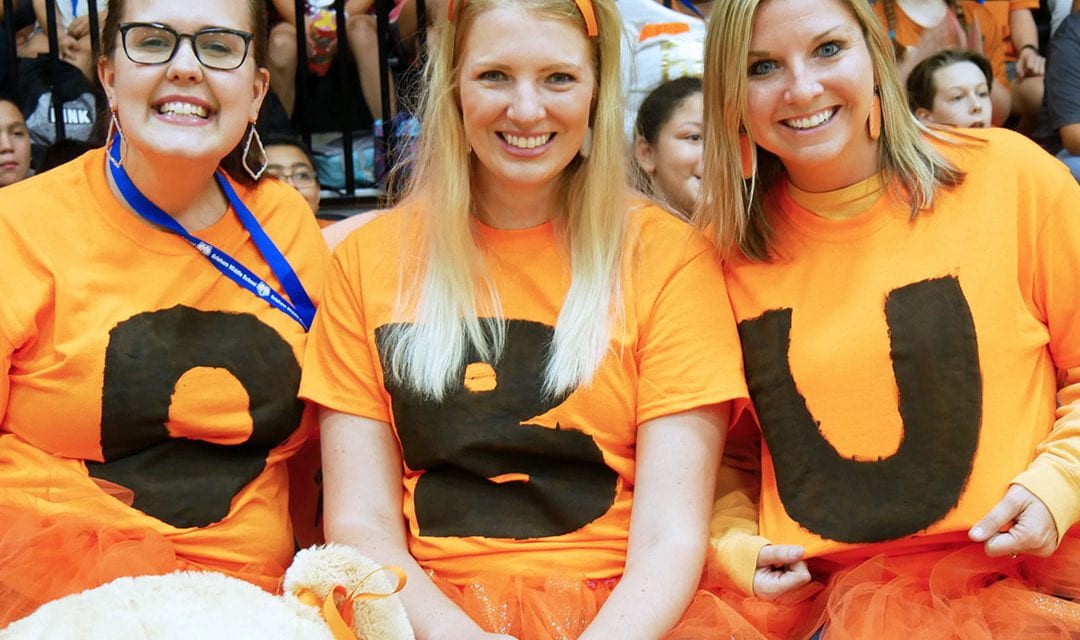Step inside Grisham Middle School and it’s instantly obvious that something exciting is in the air. The atmosphere is electric and the energy permeates hallways and classrooms, from students and teachers to administrators and support staff.
The signs are not so subtle: students in orange tutus, teachers in purple satin capes, glitter everywhere, cheers and chants echoing through the halls, not to mention random morning dance parties.
It may sound like silliness and fun—and it is—but there is a serious purpose to the spectacle and data that proves this new approach, unveiled this year at Grisham, is positively affecting academics, behavior and students’ emotional well-being.
Paige Hadziselimovic took over as principal of Grisham just over a year ago. With a change in administration, a significant about of staff turnover, and a concerning number of discipline issues, Hadziselimovic seized the opportunity to disrupt the status quo at Grisham. The school already offered an impressive International Baccalaureate (IB) Programme with a multi-linguistic and intercultural curriculum, but Hadziselimovic needed to find a way to unite the school with a sense of purpose, to bring teachers, students and staff together as family all working to support the development, well-being and academic advancement of Grisham students.
“We took the opportunity to rebrand, refresh and all move forward in one direction,” Hadziselimovic said. The school applied for and received an Innovative School Grant from Round Rock ISD, which allowed Grisham’s leadership team to research and observe innovative practices in other districts. Focusing on one of the school’s core values, “Making Grisham family,” the team was intrigued with the system that has been used for generations in the United Kingdom—splitting the school into four houses. It’s reminiscent of Harry Potter’s Hogwarts. In fact, Hadziselimovic has a sorting hat in her office. (She can’t confirm if it’s magic or not!)
At Grisham, the four houses are named after IB Learner Profile Traits translated into a foreign language: Pensatore, Italian for thinker; Ryzyko, Polish for risk-taker; Obuzayo, Zulu for inquirer; and Tongzin, Mandarin for communicator.
Teachers award points to houses for engaging in class, being kind and other positive behaviors. Teachers and staff are also assigned to houses, though administrators—who can also award points to teachers—are neutral. Points are entered into Google forms which automatically post to a leaderboard on a big screen TV near the school’s entrance. A house is named the winner at the end of every six weeks and those students get a house party and earn new levels of “trust cards.” The trust cards serve as a concrete symbol of the level of trust placed in every student and provide certain privileges such as extra Makerspace time, DJ at lunch, or tardy passes.
“The power is in the student-teacher relationship,” Hadziselimovic said. The Innovative School Grant also provided professional development in restorative practices, an approach to discipline that focuses on building healthy relationships and a sense of community to prevent and address conflict and wrongdoing. “We have teachers leading restorative circles with kids. Everyone is working together to create this really positive atmosphere where kids want to be.”
Eighth-grader Eva De Guelle said the new approach has been transformational.
“I like to observe and I see kids that don’t normally pay attention in class but, because of the house points, they’re actively listening and actively participating in class,” she said. “It’s a really great way to engage in the classroom. A lot of kids really came out of their shell when this new system started.”
The results are more than anecdotal. Last year, from the beginning of the school year until the end of October, Grisham had 155 discipline referrals. In the same time frame this year, there were 18, a reduction of more than 90 percent.
“Of those 155 referrals, there were 59 students, which means they were repeat offenders,” Hadziselimovic pointed out. “So traditional discipline didn’t change their behavior. Of the 18 this year, we had 15 students. The restorative practices and a more relationship-focused approach is actually changing the behavior.”
Sixth-grader Luca Moreno wasn’t expecting such a fun environment when he came to middle school from Anderson Mill Elementary. But he loves being part of Obuzayo House and has bonded not only with his fellow sixth graders but older students who serve as mentors as well.
“You get to make friends you wouldn’t normally meet,” Luca said. “I love the spirit and the pep rallies when everybody is screaming for their house. Everybody is just happy.”
Eva said it seems counterintuitive that dividing a school into four houses would actually unite the campus, but that is exactly what she’s experienced.
“I honestly love the house program so much. It feels different, but we’re still one family,” she said. “There’s friendly competition but at the end of the day we’re four houses, one family.”

